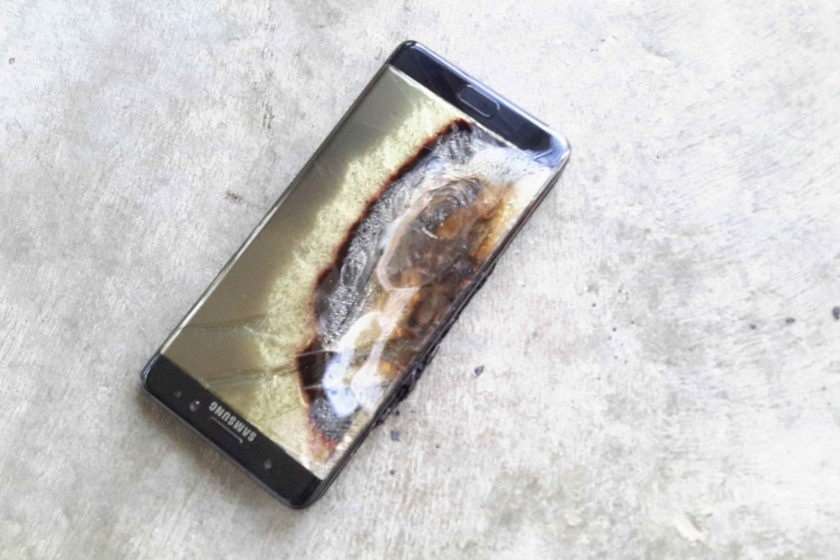The bleeding from the Samsung Galaxy Note 7 could continue for "years" if the company doesn’t deliver something truly special with its next flagship smartphone, according to Gartner.
Brian Blau, Research Vice President, said Samsung’s next expected phone, the S8, needs to really hit the mark.
“We think there's a higher requirement for them to be innovative in order to make up for some lost ground that they would have over the next year or two so we would expect to see a new type of smartphone with new types of features, and something that will help cover over the mistake they had,” he said.
The Note 7 debuted to rave reviews in August, but the plaudits turned to criticism within weeks after some of the phones caught fire or exploded. In what has become known as one of the biggest product failures in tech history, the company was forced to recall the initial 2.5 million Note 7 devices sent to customers before killing off the handset entirely in October -- after it was discovered the replacement smartphones were also suffering from the same issues.
The post-mortem has begun and questions around Samsung’s ability to bounce back are being raised. But Blau remains bullish on the company’s ability to restore its battered reputation.
“It’s their flagship smartphone and the one driving VR for them,” says Blau.
“It will be a black mark on Samsung’s smartphone line but we tend to think that Samsung will survive as long as they don’t have any additional trouble and really execute on their next handset.”
Blau drew parallels with the automobile industry where recalls are far more commonplace and yet they “rarely impact the brand”.
However, the hyper-competitive smartphone market is much more cutthroat and the industry has proven time and time again that there are no certainties when you’re on top. Samsung might currently be the largest smartphone maker in the world but the Galaxy Note 7 debacle couldn’t have come at a worse time for the company.
The Korean giant’s premier handset was supposed to take on Apple's latest iPhone for supremacy in the smartphone market over the crucial holiday shopping season. Instead, Samsung’s profits plummeted to its lowest in nearly eight years and tarnished its smartphone products in the minds of consumers and carriers. Analysts forecast that the Galaxy Note 7 fiasco could end up costing Samsung upwards of $US20 billion.
Last month, Google announced its entry into the smartphone market with their very own flagship that is set to compete for consumer mindshare against not only Apple but other Android handset makers like Samsung. Then there’s the ever mounting pressure from Chinese players, which continue to release impressive premium tier handsets at more affordable prices.
That’s exactly why Gartner's Senior VP of Research, Peter Sondergaard, feels that so much is riding on Samsung’s next phone, the Galaxy S8.
“We live in a world which has shown that the consumer forgets fast,” Sondergaard explains.
“Samsung have an opportunity to recover fast because of the rapid change of technology cycles and, provided they execute well, the company will probably recover on the brand perception side.”
Samsung seem to be executing so far with its comeback phone, if recent rumours out of Korea are to be believed.
They suggest the Galaxy S8’s front being made up almost entirely of screen, making bezels virtually non-existent. The phone will reportedly toss out the physical home button and use an optical sensor that lives beneath the display for fingerprint scanning duties.
It is also expected that Samsung will bump up the resolution to 4K, which should give the company’s mobile VR push a real shot in the arm. Additionally, the entire display is expected to be pressure sensitive -- similar to Apple’s 3D touch on the iPhone -- that could be used to access sub-menus and other functions within the user interface.
Samsung also recently confirmed the Galaxy S8 will come with AI-enabled features “significantly differentiated” from those in the market, such as Apple’s Siri or Google.
The problem is that no matter how impressive Samsung’s next phone is, it’s unlikely to lure gun-shy buyers back to the brand until it can explain in detail what went wrong last time around and how it plans on addressing the issue with future handsets.
Earlier this month, Samsung took out full-page newspaper advertisements in the US promising to disclose the reasons for the Note 7’s failure.
“A careful Note 7 investigation is underway and the findings will be shared when the analysis is complete. The process will be thorough and include some of the best independent technical experts in the world to help inform and validate our work.”
However, it appears that Samsung engineers aren’t yet any closer to figuring out the cause of the Note 7 battery fires. The Wall Street Journal, citing sources close to the South Korean tech giant, is reporting that executives within the company are now looking to delay the announcement of the Galaxy S8 until as late as April. Further delays should be expected if Samsung cannot pinpoint the exact cause of the Note 7 fires over the coming months.
Until it does, the damage to Samsung’s reputation could be far greater than its short-term financial losses.









